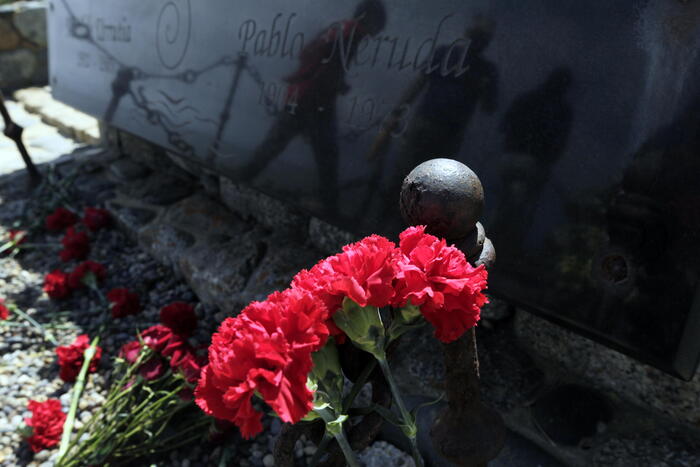They are images, wings solitude.
Neruda: the last end of words
Between scary feathers, between nights,
among magnolias, among telegrams,
between the south wind and the sea west,
you come flying
(Alberto Rojas Giménez comes flying)
It is one of the most prodigious poems ever written and the mere fact that it and the book that contains it exist is a miracle.
Further back, there is the hallucinating vision of a beginning:
Like ashes, like seas filling up,
in the submerged slowness, in the formlessness,
or how they are heard from the top of the roads
cross the bells in cross...
It is the beginning of “Galope muerto”, the first poem in
Residencia en la tierra
, and the effect is immediate: we catch a glimpse of the traces of a new genesis: the tone, the texture of the image, its whiteness, its immensity, and our experience is once again that of being in front of an impossible monument: nothing of
Residence on earth
it was predicted.
Unlike Borges, for example, whose work, undoubtedly superlative, is in one way or another contained within the speculative horizon of a world that has created the theory of relativity and multidimensional geometries, so it is not implausible to deduce, Borges-like, that if he had not written "Las ruinas circularas" or "El Aleph", someone else, another Borges, would have done it;
There was nothing, absolutely nothing in a culture or in a history or in a language that suggested that this set of poems ranging from "Galope muerto" to "Josie Bliss", which closes the second volume of
Residencia
, could be written, but it was written.
That is to say, the immortal litany of Alberto Rojas was written, it was written as a shipwreck inward we die, from “Only death”, the original water and ashes of “Walking around” was written.
The instant luminosity of a new birth was written together with the formless and inexhaustible darkness of a new death.
More information
Raúl Zurita: "We are living through the agony of language"
As is known, the poems of the two
Residences
were composed between 1925 and 1935, and fundamentally while Neruda was serving as consul in the east, first in Rangoon, then in Colombo and Batavia, present-day Jakarta, a period that all his scholars agree on. in pointing out as a key to his work and his life.
The affirmation is indisputable and at the same time empty;
biographical circumstances report a white point in writing, but do not account for its shadow, that central rectification of the data that art executes about life and which is exactly what we call Rimbaud, Whitman, Borges, Neruda.
But even beyond that, there is something that happens specifically with poetry
,
something that has not yet been formulated and that makes it profoundly refractory to the vice of interpretations.
Parallel to the world, the great poems represent the last limit of language, there is nothing beyond, and therefore they are themselves the final interpretation, the last strand of words.
It is not implausible to deduce, Borges-like, that if Borges had not written "Las ruinas circulares" or "El Aleph", someone, another Borges, would have done it;
There was nothing, absolutely nothing to suggest that this set of poems ranging from "Dead Gallop" to "Josie Bliss" could be written.
There is no other dialogue with poetry that is not that of emotion and inference (but that emotion and that inference have raised nations, have created peoples, have announced the endless Apocalypses).
We can then imagine the landscapes and settings of the
Residences
;
those ashes, those seas becoming populated and in front of them a still nameless being who, in an instant, seeing the breakers sweep the deserted beach over and over again, suddenly understands that they will continue to be there, rising and falling endlessly, but that there is a dawn in which he will no longer see them and he makes the most transcendental of discoveries, the one that is inserted in each particle of what we are (in these fingers that type with difficulty, in the songs that I put on at dawn to avoid anguish , in my skepticism, in your thirst María): discover death, and immediately after discover language, which is, above all, the spell that human beings cast in the face of the absolute, incomprehensible, terrifying fact that we must die.
The first of those spells is what we call the poem.
It is the central poetic fact and the apparent strangeness of Nerudian geography, its floating cots, its orthopedic stores, are the spells that language throws at death to postpone it and in that radical, irrecusable confrontation, all spheres are mobilized. of existence.
We are children of that confrontation, we are children of death and the poem.
Stretched then between death and life, the poems of the
Residences
make us see that in that titanic, devastating, endless struggle that these two twin brothers wage between them, language and death, the history of poetry is history eternally. defeated and eternally renewed from the spells with which language tries to postpone the duty of dying.
Pablo Neruda, Nobel Prize for Literature in 1971, in Prague, in an undated photograph. CTK / Alamy
The poems of
Residence on Earth
, in their astonishing particularity, in their unique register, in their fidelity to the sounds that Neruda actually heard, merge with the words of our life, giving the language we speak, that language dated to us, the symbolic possibility of a new start.
Of a new alternation where the beings and shadows that speak in these poems, in their jargon for the dead, in their soundless bells, in their oceans of origin and ashes, are in turn the thousands and millions of fragments of experiences, of failures. , of eroticizations, of women urinating and of minor officials who pass through the streets of Rangoon and others who wander between tailor shops and hanging clothes, hermetic as a felt swan, who, joining one by one, make up the humanity that inhabits the Residences
.
.
It is not a voice, it is that gelatinous, almost infinite compendium of blood, nerves, culture, dreams, memories, unexpected heroism, bowel movements and hopes that drain into language, which appears in this synthesis that simultaneously points out the insurmountable limits. of a void.
Neruda is Neruda because he is the entire humanity, the entire humanity is the entire humanity because it is a void, Neruda is the entire humanity because it is the void that death leaves behind in words:
But death also goes through the world dressed as a broom,
licks the ground looking for the dead,
death is on the broom
It is the tongue of death looking for the dead,
It is the needle of death looking for a thread.
Installed in the heart of the language, only Pablo Neruda, that is to say, only that number, that time that we call today Pablo Neruda, was able to write
Residencia en la tierra
, but he was able to do it because his readers are wounded, bleeding beings, who are following the lines of these poems the seasons of his blood and his death.
We reside on earth, that is to say, we reside in the naked truth of this writing, not in its rhetoric, but in that essential laconicism that is irremediable: we are dead beings lent to life for a second, we live, we die, and that is extreme and paradoxical condition which is reiterated time and time again by the masterpieces:
Dante's
Comedy , Don
Quixote
, Shakespeare, Dostoyevsky, Whitman, Rimbaud, the
Song of Songs
de Pound,
Residence on Earth
,
Neruda's
Canto general .
In other words, what these works show us is that we are not inhabited only by our dreams, just as we are not punished only for our crimes.
In a world that has infinitely multiplied the Trojan present, and that has the planet on the brink of collapse, what is real, what is frighteningly real, is the void left by words once they are spoken.
Behind "Only Death" there is nothing but death.
Condemned not to forget (the destruction of Troy did not happen, it is happening and Homer is nothing but the undulation of his future), we delve into that timeless past where the immense phantasmagoria that flies over Alberto Rojas Giménez, those "seas with no one", those “Alone among the dead”, those “forever alone”, come flying without a shadow and without a name, without sugar, without a mouth, without rose bushes.
Furthermore, it is as if those abstract, dead entities, transformed into concepts in that perpetual present that constitutes poetry, make it the last interpretation, showing us in passing that the human (I insist on calling that sea, that overflow like that) ) not only is he not the owner of the language he speaks, but, on the contrary, he is caught in an invention of words.
We understand then that poetry is not the confessional of the self, it is the confessional of others.
Alberto Rojas Giménez is flying.
They are images, wings, solitudes...
There is the sea.
I go down at night and I hear you
come flying under the sea with no one,
under the sea that inhabits me, darkened:
you come flying
I hear your wings and your slow flight,
and the water of the dead hits me
like blind and wet doves:
you come flying
You come flying, alone, lonely,
alone among the dead, forever alone,
you come flying without a shadow and without a name,
without sugar, without mouth, without rose bushes,
you come flying
They are images.
It is a tone, a timbre, a tremor.
Anchored in an indiscernible time, a still nameless being understands that the stars he had seen a moment ago are the ultimate refutation of time and history.
Raul Zurita.
Ospedale Maggiore, Milan, July 16, 2019.
This text is the prologue to the new edition of 'Residencia en la tierra' that the Lumen publishing house publishes this Thursday.
You can follow BABELIA on
and
, or sign up here to receive
our weekly newsletter
.

/cloudfront-eu-central-1.images.arcpublishing.com/prisa/3OTDJKV6QBH45BJFZFAHMEPWPU.jpg)













